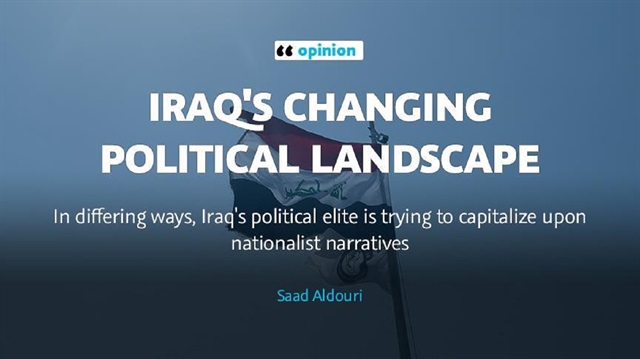
In differing ways, Iraq's political elite is trying to capitalize upon nationalist narratives
Following the military defeat of Daesh, significant changes in Iraq’s political landscape have already started to take shape.
Alliances are shifting and new political parties are being formed in an attempt by Iraq’s political figures to respond to the demands for change across a country where mass protests against corruption and public service failures have been ongoing since 2015.
These shifts indicate that the post-2003 political elite realizes that it must adapt if it is to survive: it can no longer rely on identity-based politics and instead must embrace a new era of issue-based politics.
The community-based structure of Iraq’s political formations have not changed significantly since 2003. However, Iraq has entered into a period of significant flux, which is affecting the three major Shia political parties.
The Sadrist Movement and the liberal secular al-Wataniya coalition, led by former Prime Minister Iyad Allawi, on 22 June announced the formation of a political alliance for next year’s national elections. This alliance could have significant implications on the political landscape as both appeal to different constituencies, with the Sadrist movement gaining much of its support from the urban poor and the al-Wataniya being supported by many middle-class Sunni and Shia professionals.
While these two parties have had their differences in the past, they are both predominantly nationalists who seek to transcend sectarian narratives and oppose overt Iranian influence in Iraq.
Importantly, both parties are also seeking to change the electoral law ahead of the national elections next year. In the aftermath of the battle against Daesh, there is a good chance that their nationalist message will have a broad appeal among Iraqis across the country.
In another significant development, Ammar al-Hakim resigned from his post as the leader of the Islamic Supreme Council of Iraq (ISCI), to form and lead a new political party, the National Wisdom Movement. The departure of al-Hakim and the establishment of the National Wisdom Movement is yet another setback for ISCI.
But it has not come as a surprise: ISCI has been weakened by the departure of key members of the party, including former oil minister Adel Abdel Mahdi, over disagreements at the party’s distancing from its former military affiliate, the Badr Brigades, and the leadership of Hakim.
In forming a new party, Hakim is seeking to adopt a more nationalist narrative and appeal to a broader constituency of voters, particularly among the youth.
The changing political landscape is also likely to have significant implications on the internal dynamics within the Dawa Party. Both the current and former prime ministers, Haider al-Abadi and Nouri al-Maliki, are members of the party, with Maliki remaining the secretary general.
Yet, they represent different visions for the party and wider leadership of the country, which is leading to factional splits. Maliki is presenting himself as a strongman and the champion of the powerful, and has the backing of both Iran and the powerful Iran-backed Shia militias in Iraq, whereas Abadi has sought to contain the influence of Iran and the militias in the political sphere.
While Maliki retains support from large parts of the party, the fact remains that key factions within the party turned against him to prevent him from becoming prime minister again in 2014, instead backing Abadi as the consensus candidate.
Indeed, local media have reported that Abadi may be planning to form a breakaway party of his own for the elections. It appears certain that Abadi and Maliki will both be vying for the premiership in next year’s elections.
It is not only the position of the Shia political entities that is shifting. Since 2003, senior Kurdish politicians have held important posts in government. However, last year’s removal of Hoshyar Zebari effectively left no significant Kurdish figures in the capital.
While the Iraqi president, Fouad Massoum, is Kurdish, he has limited influence in Kurdish circles. This has significant implications on the functioning of the Iraqi political system and is indicative of low confidence amongst Kurdish representatives in participating in it.
With the Kurdish independence referendum scheduled for a month’s time, a number of senior Kurdish politicians, led by President Masoud Barzani, believe that the time is now for Kurdish independence.
Nevertheless, there are still a number of significant obstacles facing Kurdish independence and it remains unclear how Kurdish representation in Baghdad will emerge after the national elections next year.
In differing ways, Iraq’s political elite is trying to capitalize upon the nationalist narratives that have become prominent during the past three years. What is clear is that the political elite since 2003 cannot remain as it was, and what we are seeing with the establishment of new parties and alliances is a response to those demands, with a view to next year’s national and provincial elections.
While the impact of the Kurdish referendum and the KRG’s relationship with Baghdad is uncertain, shifting dynamics within the major Shia Islamic parties will have a fundamental impact on next year’s elections. It may be decisive for the future direction of the Iraqi state, in what is a critical period of reconstruction and development for the country.
* Opinions expressed in this article are the author’s own and do not necessarily reflect the editorial policy of Anadolu Agency.


